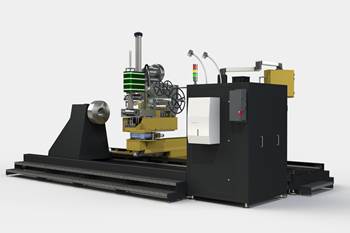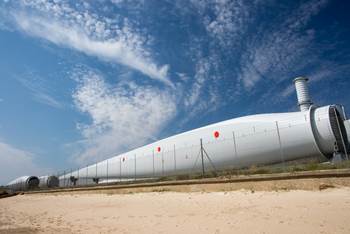Search Results
Showing 41 – 50 of 2660 results
High-pressure gas storage vessels represent one of the largest and fastest-growing markets for advanced composites, particularly for filament-wound carbon fiber composites. Although they are used in self-contained breathing apparatuses and provide oxygen and gas storage on aerospace vehicles, the primary end markets are for storage of liquid propane gas (LPG), compressed natural gas (CNG), renewable natural gas (RNG) and hydrogen gas (H2).
Filament winding is a specialized technique used in composite manufacturing, involving the precise and automated winding of continuous fibers onto a rotating mandrel or mold. This method allows for the creation of strong and seamless structures, optimizing the alignment and orientation of the fibers to meet specific design requirements. Filament winding is employed in producing cylindrical or conical composite parts, such as pipes, pressure vessels, and aerospace components, enabling engineers to tailor the strength, stiffness, and performance characteristics of the final product.
Processes in composites manufacturing encompass a diverse array of techniques employed to fabricate composite materials. These processes include methods like hand layup, where layers of resin and reinforcement materials are manually placed, and vacuum infusion, where a vacuum draws resin into a preform. Other techniques like compression molding, filament winding, and automated methods such as 3D printing are utilized to create intricate and specialized composite structures. Each process offers unique advantages in terms of precision, scalability, and efficiency, catering to diverse industry needs. As technology advances, newer methods are emerging, promising faster production cycles, reduced waste, and increased customization, driving the evolution of composite manufacturing towards more sophisticated and versatile methodologies.
The wind energy market has long been considered the world’s largest market, by volume, for glass fiber-reinforced polymer (GFRP) composites — and increasingly, carbon fiber composites — as larger turbines and longer wind blades are developed, requiring higher performance, lighter weight materials. The outer skins of wind and tidal turbine blades generally comprise infused, GFRP laminates sandwiching foam core. Inside the blade, rib-like shear webs bonded to spar caps reinforce the structure. Spar caps are often made from GFRP or, as blade lengths lengthen, pultruded carbon fiber for additional strength.
Waste2Fiber facility will use a proprietary thermal method to separate wind blade materials for reuse and will have a processing capacity of 6,000 tons of material/year.
Launch of the “Propellers and Rotors” Joint Partner Project looks to the potential of composite materials and technologies for future product concepts.
Real-world demonstrations in the U.K. will prove the Artemis EF-24 CTVs capability to operate safely under extreme wind and tide conditions for wind farm operators.
CompoTech features its CDuro Epona mountain bike fitted with custom suspension forks, manufactured using its AFL winding and integrated loop technologies.
The 130-megawatt utility-scale wind farm off the coast of Long Island leads state efforts to install 9 gigawatts of offshore wind by 2035.
Lattice Composites, a custom formulator and manufacturer of epoxy resin-based advanced materials, has purchased the entirety of a previous business partner’s equity.
CAMX 2024: Century Design Inc. highlights its OnDemand towpreg systems, designed to provide differentiation and cost efficiency in-house while maintaining high quality.
JEC World 2024: Engineering Technology Corp. is exhibiting offerings ranging from high-speed filament winding equipment to integrated robotic solutions, in addition to new standard line of tape wrappers.
With a DOE grant in hand, UMaine’s ASCC seeks to develop an approach to recycle shredded wind turbine blade material as a cost-effective reinforcement and filler for large-scale 3D printing.
Scotland’s renewable energy trade body joins several other members to guide and support technology advancement for recyclability and future wind blade development.










